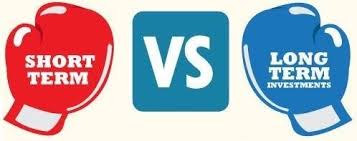How To Consider Short-Term vs. Long-Term Investing
 People can invest money for just a few months or for many years. Usually, the timeframe you choose for an investment depends on a certain event. If you’re buying a house in 2 years, for example, you may plan your investments based on that event. It’s critically important, however, to understand the benefits and risks for the investments that you choose. Here are some common investments and the pros and cons of investing in each one.
People can invest money for just a few months or for many years. Usually, the timeframe you choose for an investment depends on a certain event. If you’re buying a house in 2 years, for example, you may plan your investments based on that event. It’s critically important, however, to understand the benefits and risks for the investments that you choose. Here are some common investments and the pros and cons of investing in each one.
Stock investing
Stock investing is a great way to profit from a company that grows its sales and earnings. Investors reward good companies by buying their stock and pushing up the stock price. You choose the dollar amount of stock you purchase, and you can sell your stock on any business day.
While stock prices can increase, your stock’s value can also decline sharply. Your investment's value depends on the company’s financial performance. The price is also influenced by national and international business news.
Stocks can be held for any length of time. Many people hold stocks as an investment for decades. These securities are used to fund retirement or some other long-term investment goals.
Investing using options
The website for 24option explains that an option is a forecast of the market price of a specific asset. In addition, an option is a forecast of how the market price of the asset will perform over a specific time period.
A binary option allows you to invest in a variety of assets with a smaller amount of money. For example, you may buy an option on the value of the American dollar. If you believe that the value of the dollar will rise in comparison with other currencies, you can buy an option on the dollar.
Like stocks, the value of your option can decline sharply, depending on what occurs in the markets. If you’re interested in a short-term investment, an option contract expires in just a few months. As an option buyer, you can choose to sell your option or let the option expire on the expiration date.
Real estate as an investment
The real estate you own may be your primary residence, or rental property. One benefit of real estate is that the value typically increases as inflation goes up. Inflation is the overall increase in retail prices over time. If inflation is increasing, your real estate may also increase in value.
An investment in real estate offers some tax advantages. You may be able to deduct the interest you pay on your mortgage loan. If you rent your property, the interest expense will reduce the taxes you pay on any rental income. You also need to maintain the property. If you don’t have the skills to maintain a rental property, you may need to hire a property manager.
Real estate, however, is more difficult to sell than stocks or options. It may take months to find a buyer. You may also need to get an appraisal before any sale. Your real estate investment should be considered a long-term investment.
Collectibles, artwork
Many people collect antiques, coins or artwork. Like real estate, it can be difficult to find a buyer for these assets. Also, the price of these assets can be hard to determine. You’ll need to get an appraisal and find a buyer.
Some people assume that they’ll never sell these investments. They bought these items simply to enjoy them. They may intend for these assets to be passed on to their heirs. Collectibles and artwork are typically long-term investments.
Take the time to consider how long you want to own an investment. Think through the pros and cons of each investment. These decisions can make a huge impact on financial future.
Amanda Green is a site contributor that often writes on personal finance, marketing and business. In her free time she enjoys reading and playing volleyball with family and friends. Her work may also be found on http://www.paidtwice.com

 Delicious
Delicious Digg
Digg StumbleUpon
StumbleUpon Propeller
Propeller Reddit
Reddit Magnoliacom
Magnoliacom Newsvine
Newsvine
Comments
Post new comment